ICJS History
Founding Era: 1987
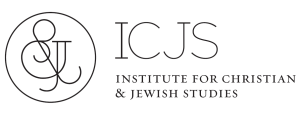
The first ICJS logo.
ICJS was founded in the context of the historic changes in Jewish-Christian relations that began, in part, with the Roman Catholic Church’s Second Vatican Council and its 1965 seminal document, Nosta Aetate. This statement changed the Church’s relationship with Judaism and the Jewish people.
Cardinal Lawrence Shehan of Baltimore, accompanied by a young priest, Fr. P. Francis Murphy, played a key role in the drafting and adoption of Nostra Aetate, which repudiated antisemitism and the charge that Jews were collectively guilty for the crucifixion of Jesus Christ.
A number of years later, then-Bishop Murphy assembled a Catholic study group to consider the implications of Vatican II, particularly as it concerned the Church’s stance toward Judaism. Shortly thereafter, two other Baltimore religious leaders, the Rev. Robert Patterson, rector of the Episcopal Church of the Redeemer, and Rabbi Mark Loeb of Baltimore Hebrew Congregation, assembled a similar Protestant interfaith study group. These two study groups eventually merged, forming a truly interreligious gathering.
A seminal event occurred in 1984, when representatives of the Murphy, Patterson and Loeb group attended the 8th National Workshop on Christian-Jewish Relations in St. Louis. An opportunity arose when the next city slated to host the conference dropped out, and the Baltimore contingent seized the opportunity. The 9th National Workshop on Christian-Jewish Relations was held in Baltimore in May 1986, and had the workshop’s largest participation, with more than 1,200 attending. The focus was more theological than previous sessions, and the major presentations were delivered by nationally and internationally recognized scholars. The presentations were published in two volumes by Paulist Press.
To capitalize on the momentum of the national workshop, a group of clergy, lay congregants, and Baltimore business leaders created the Institute of Christian & Jewish Studies in 1987, electing Richard Berndt, Bernard Manekin, and Charles Obrecht as its first co-chairs. After a national search, the Rev. Dr. Christopher Leighton was appointed executive director and led the ICJS for the next three decades.
Early Years: 1988-1997
In its early years, ICJS focused on combating anti-Semitism and anti-Judaism in Christian communities by facilitating dialogue between Christian and Jewish clergy.
In 1996 journalist and producer Bill Moyers launched a PBS series, Genesis: A Living Conversation, and he selected ICJS and Baltimore to develop a pilot project to host interfaith, multiethnic educational events using the series and viewers guide. Baltimore-area congregations partnered with one predominantly white church, one predominantly African American church, and one synagogue to meet together and discuss the Genesis curriculum over several years.
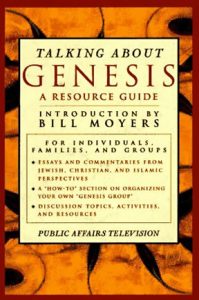
Genesis Resource Guide
From 1988-1991, ICJS sponsored the Maryland Interfaith Project, where 200 clergy and lay leaders from Christian denominations met monthly to consider the teaching of contempt in their own teachings and scriptures. Dr. Leighton developed curriculum for the 10 participating denominations. The ICJS also took clergy and lay people from the Maryland Interfaith Project on study trips to Israel and Palestine.
In 1994, ICJS inaugurated the Scripture Forum, where local Jewish and Christian clergy studied their scriptures together that continued for more than two decades.
The Second Decade: 1998-2007
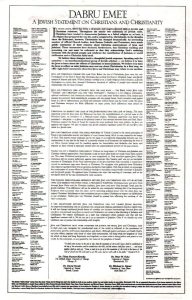
Full-page Dabru Emet ad in the New York Times
In the late 1990s, ICJS convened a working group of rabbis and other Jewish leaders to form the National Jewish Scholars Project. In 2000 they produced Dabru Emet: A Jewish Statement on Christians and Christianity, a ground-breaking document in Jewish-Christian relations. Dabru Emet (Hebrew for “Speak the Truth”) was published on Sunday, Sept. 10 as a full-page statement in the New York Times, the Baltimore Sun and other major newspapers and religious internet sites.
Rabbi Joel Zaiman, an ICJS founding board member, played a key leadership role in the conception and publication of Dabru Emet. As past chair of the Synagogue Council of America, Rabbi Zaiman used his local and national contacts to raise interest and funding to bring scholars to Baltimore. These scholars engaged in study and discussion to craft a Jewish response to the efforts of Christians in the later 20th century to examine their own tradition’s teachings and perceptions about Judaism.
Dabru Emet was written by four interdenominational Jewish scholars and was eventually signed by more than 220 rabbis and other Jewish intellectual leaders. Consisting of eight claims pointing out common ground between Christians and Jews and offering a legitimacy of Christianity from the Jewish perspective, Dabru Emet generated both praise and criticism. It served as a significant, as well as contested, moment in the fields of modern Jewish thought, Jewish–Christian relations, and interfaith and interreligious studies.
In 2021, ICJS curated and co-published an online forum of 32 essays to revisit the statement 20 years later, offering both commemoration and critique.
Anniversary: 2008-2014
Following 20 years of using office space at Brown Memorial Park Avenue Presbyterian Church, ICJS completed a capital campaign and in 2008 built the Bunting-Meyerhoff Center in Towson.
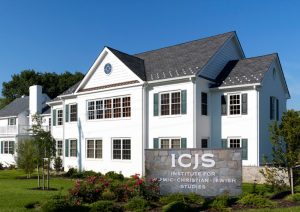
The Bunting-Meyerhoff Center at 956 Dulaney Valley Road in Towson
In 2012, ICJS inaugurated the annual Manekin-Clark Lecture, which brings nationally known religious leaders to Baltimore to speak on relevant interreligious issues.
Also, in 2012, ICJS marked its 25th anniversary.
In 2013, ICJS collaborated with the Washington Theological Consortium to develop the Emerging Religious Leaders Intensive program, a one-week intensive session of education and dialogue for Christian seminarians and Jewish rabbinical students.
In 2013, a group of secondary school teachers approached ICJS in the hope of creating greater professional development and training programs for educators who teach about religion. ICJS created programming for educators to offer resources and cross-institutional for teachers in public, independent, and religious schools.
In 2014, ICJS began Reclaiming the Center, a program that guided Christian and Jewish congregations in interreligious study and dialogue, piloting it in Atlanta in partnership with First Presbyterian Church of Atlanta and The Temple. ICJS also developed a teaching program, called Abraham’s Children, in partnership with World Pilgrims, to guide Jews, Christians, and Muslims in interfaith dialogue.
Transitions: 2016-2017
In 2016, Trustees approved changing the name to the Institute for Islamic, Christian, and Jewish Studies, although keeping the moniker ICJS. This transition actually began three years prior, when ICJS Trustees approved the expansion of the organization’s mission to include Islam.
In 2016, in response to the citywide unrest following the death of Freddie Gray, ICJS launched two interconnected programs:
- Imagining Justice in Baltimore—citywide conversations based on teachings from Jewish, Christian, and Muslim traditions.
- Justice Leadership Fellowship—a year-long cohort of nonprofit, civic and community leaders who consider how diverse religious teachings can frame local justice issues.
In 2016, founding executive director Christopher Leighton stepped down after 29 years of leading ICJS. (Note: in 2024, Chris completed his memoir, A Sacred Argument: Dispatches from the Muslim, Jewish, and Christian Encounter.

Chris Leighton
In 2016, Heather Miller Rubens, ICJS Roman Catholic scholar, was named executive director.
Expanding Audiences: 2018-Present
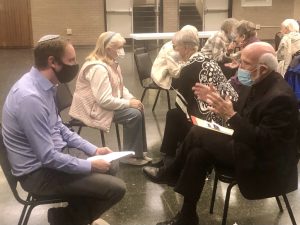
Rabbi Andy Gordon and Fr. Joe Muth share at interfaith event with Bolton St. Synagogue & St. Matthew Catholic Church
In 2018, ICJS launched the Teachers Fellowship, a one-year cohort to equip educators to become leaders in raising interreligious literacy and innovating new pedagogy around religion in secondary schools.
In 2021, ICJS welcomed its first Congregational Leaders Fellowship cohort, which includes clergy and lay leaders from congregations in the Greater Baltimore region who engage in a year-long intensive process of deepening relationships and understanding across religious traditions. This is ICJS’ first congregational program that includes Muslim communities.
In 2021, the Board of Trustees and ICJS staff adopted a new Strategic Framework that will guide the vision, mission, and future of ICJS for years to come.